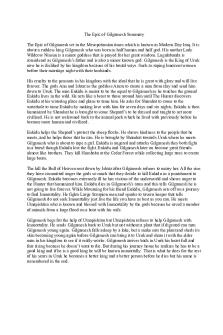Epic of Gilgamesh Essay PDF

| Title | Epic of Gilgamesh Essay |
|---|---|
| Course | The Ancient Near East |
| Institution | University of San Francisco |
| Pages | 3 |
| File Size | 28.4 KB |
| File Type | |
| Total Downloads | 34 |
| Total Views | 158 |
Summary
Epic of Gilgamesh Essay...
Description
The Epic Of Gilgamesh The way of the gods has always been the way of the people- do as the gods say or else. The gods depended on kings and whomever they chose, to be their voices to the people because the order of the universe was set forth by the gods themselves and that was how cosmological order was kept. However, “The Epic of Gilgamesh” showcases what happens when the way of the gods is not followed and how individuals were punished for disobeying the gods. It was the human nature of Gilgamesh that lead to his inability to follow the cosmological order that was set forth by the gods and was therefore, punished for disobeying them. Gilgamesh, being the king of Uruk, had the responsibility of being the “shepherd of the people”. However, with Gilgamesh being half god and half human, disobedience and free will followed since even the creations made by the gods were made from ‘“a very imperfect tool” (George xxxix). So while the purpose of his life was to “be of the service of the gods” (George xxxvii) and to fulfill the god’s “functions as they intended” (George xxxvii), it was his human nature that lead his astray of the god’s wishes. It was Gilgamesh’s narcissistic attitude and incapability to follow as the gods ordered, that lead to his ultimate downfall. He, instead of looking out for the people of Uruk like the gods had wanted, began to be Uruk’s main source of terror. He “let no son free to his father” (George 3), “let no daughter go free to her mother”(George 3), and therefore the gods decided to overthrow Gilgamesh
for the safety of Uruk and his inability of doing what the gods said. In result, the goddess Aruru set forth to create a match against Gilgamesh himself in order to rid Uruk of him and to punish him for disobeying the orders of the gods. It was Gilgamesh’s disobedience that caused a strife in the cosmological order of the universe which was followed by chaos- the creation of half man and half beast Enkindu. He was “the hero, offspring of silence, knit strong by Ninurta” (George 5) that was created in response to Gilgamesh’s failure to listen to the god’s due to his human nature. His human nature (i.e. his narcissism, huge ego, and thirst for power) represented his failure to uphold his promise to the gods- the promise of being of service to them. Therefore, Enkindu represented the anger of the gods, the chaos from the lack of order in the universe, and the consequence for the lack of obedience from the king of Uruk. All in all, the Epic of Gilgamesh showcase how important it was to follow what the gods said and what they wanted. They are the voice of all people in the universe and therefore should be treated for who they are- divine entities because at this time, it was believed that the reason for the existence of each person in the universe was to serve their gods. Therefore, when these needs are not met, consequences will ensue (i.e. the creation of Enkindu) which made the Epic of Gilgamesh a warning to those who were tempted to stray from what the gods had wanted.
Bibliography George, A. R. The Epic of Gilgamesh: The Babylonian Epic Poem and Other Texts in Akkadian and Sumerian. Print....
Similar Free PDFs

Epic of Gilgamesh Essay
- 3 Pages

The Epic of Gilgamesh - homework
- 1 Pages

The Epic of Gilgamesh Summary
- 1 Pages

30 - Epic of Gilgamesh excerpt
- 4 Pages

The Epic of Gilgamesh – Prompt 1
- 3 Pages

Gilgamesh Essay - Grade: A+
- 2 Pages

Gilgamesh paper
- 7 Pages

Reseña Gilgamesh
- 2 Pages

Gilgamesh guia contestada
- 2 Pages
Popular Institutions
- Tinajero National High School - Annex
- Politeknik Caltex Riau
- Yokohama City University
- SGT University
- University of Al-Qadisiyah
- Divine Word College of Vigan
- Techniek College Rotterdam
- Universidade de Santiago
- Universiti Teknologi MARA Cawangan Johor Kampus Pasir Gudang
- Poltekkes Kemenkes Yogyakarta
- Baguio City National High School
- Colegio san marcos
- preparatoria uno
- Centro de Bachillerato Tecnológico Industrial y de Servicios No. 107
- Dalian Maritime University
- Quang Trung Secondary School
- Colegio Tecnológico en Informática
- Corporación Regional de Educación Superior
- Grupo CEDVA
- Dar Al Uloom University
- Centro de Estudios Preuniversitarios de la Universidad Nacional de Ingeniería
- 上智大学
- Aakash International School, Nuna Majara
- San Felipe Neri Catholic School
- Kang Chiao International School - New Taipei City
- Misamis Occidental National High School
- Institución Educativa Escuela Normal Juan Ladrilleros
- Kolehiyo ng Pantukan
- Batanes State College
- Instituto Continental
- Sekolah Menengah Kejuruan Kesehatan Kaltara (Tarakan)
- Colegio de La Inmaculada Concepcion - Cebu






